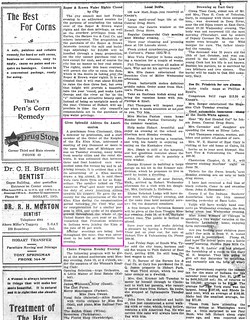
(Click on image to enlarge)
Hobart Gazette, June 15, 1923.
The Hobart News reported that as many as 4,000 people may have attended. "It was estimated that there were 500 automobiles at the field and the streets leading to the grounds. Machines were there with Illinois licenses, as well as Ohio licenses."[1] The News described the location as "the open field north of the Fifield addition" — the Fifield addition lying south of Home Street between Linda and Illinois; that location is compatible with the Gazette's "open field east of Michigan avenue."
The following week the Hobart papers reported that the KKK had been rebuffed by Gary officials, having sought permission to hold meetings on private or public land and been refused by both Mayor R.O. Johnson and Park Board President W.R. Gleason.[2] That is not so very surprising. We should remember that the 1920s Klan, in addition to being white supremacist, was strongly anti-immigrant and anti-Catholic, and the people it targeted could be found in significant numbers in Gary, working and voting. A historian of the 1920s Klan in Indiana notes that "the Gary Post-Tribune, which operated under the control of U.S. Steel … usually sought to avoid antagonizing Gary's many foreign-born and black workers."[3]
We should also remember that the 1920s Klan vociferously supported Prohibition and sexual morality, and I have the impression that the flouting of both of those principles was big business in Gary at that time. In a brief historical sketch of R.O. Johnson on the I.U. Northwest Calumet Archives website, we learn that he was first elected Mayor before Prohibition, but failed to be re-elected after his "indifference to the prevalence of prostitution and gambling in Gary" lost him the support of U.S. Steel officials. The sketch goes on to cover his career in the 1920s:
Johnson's second term of office (1922-1925) was rocked by prohibition scandals, and subsequently Johnson was among those indicted and arrested by Federal authorities for conspiracy to violate the national prohibition laws. In March, 1923, Johnson was convicted in the Federal District Court in Indianapolis. Mayor Johnson received the heaviest sentence, a fine of $2,000 plus 18 months in the Atlanta penitentiary. He left for Atlanta in April, 1925, to serve his term; however, he was released from prison in November, 1925, having served one third of his original sentence. Johnson received a presidential pardon from Calvin Coolidge in March, 1929, which restored to him the privileges of a U.S. citizen. Shortly thereafter, a Superior Court Judge in East Chicago ruled that Johnson was legally eligible to hold public office.
R.O. Johnson won the Republican nomination for Mayor of Gary, and was elected by a substantial majority in November, 1929.
The disappointed Kleagle of Gary announced plans to hold a meeting in Hobart instead.[4]
_______________
[1] "Estimated There Were 2,500 to 4,000 at Klan Meeting Here Tuesday Night," Hobart News, June 14, 1923.
[2] "Mayor Johnson of Gary Refuses to Allow First Klan Meeting," Hobart News, June 21, 1923; "Klan Meeting at Gary Prevented," Hobart Gazette, June 22, 1923.
[3] Leonard J. Moore, Citizen Klansmen: The Ku Klux Klan in Indiana, 1921-1928 (Chapel Hill and London: University of North Carolina Press, 1991), 31.
[4] "Klan Meeting at Gary Prevented," Hobart Gazette, June 22, 1923.

2 comments:
I always wonder how many people actually agreed with what was said during these meetings, and how many people just saw it as something to do. Good for Gary for saying no anyway.
I wonder the same thing. The 1920s Klan cloaked itself in such unobjectionable things as patriotism and Christianity and family values ... and racism was just so mainstream then. A white Protestant person attending a Klan rally might look at it as just another fraternal order, and it seemed like everyone belonged to at least one fraternal order in those days.
From my reading I gather there was some resistance from Indiana Catholics. Also I think in other states people who were making money from illegal alcohol sometimes attacked Klan members.
I'd like to think the Gary officials were taking a principled stand, but I'm afraid it was more a case of just not wanting any trouble in their town.
Post a Comment